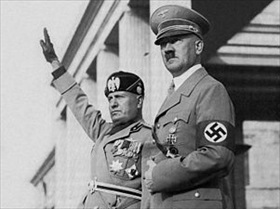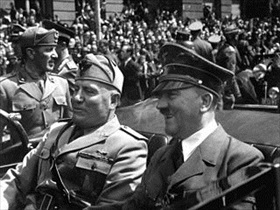ITALY HINTS AT ATTACK ON GREECE
Brenner Pass, Italy · October 4, 1940
On this date in 1940, at a border crossing between Germany and Italy, Benito Mussolini and Adolf Hitler met for the seventh time. (The two would meet seventeen times.) The Brenner Pass meeting of the two dictators followed on the heels of their June 18 meeting in Munich, which focused on the imminent French surrender to the German Wehrmacht on June 22. In between the two meetings, Mussolini had urged Hitler to allow Italy to participate in the planned attack on Great Britain, mostly in order to claim some of the projected spoils, among them semi-independent Egypt, with its Suez Canal, and the jointly administered Anglo-Egyptian Sudan (modern-day Sudan and South Sudan) to add to Italy’s African empire (at the moment Libya, Ethiopia, Eritrea, and Italian Somaliland). Hitler politely but firmly rejected the Duce’s offer of an Italian expeditionary corps, citing the difficulties of supplying two invasion armies, but accepted modest Italian air force participation against the Royal Air Force during the Battle of Britain (June–September 1940). In the Brenner Pass meeting Mussolini laid the groundwork to justify his next conquest, Greece, which Hitler didn’t seem to pick up on. Instead, Hitler was preoccupied with Luftwaffe losses over England, which had caused the Fuehrer to postpone Operation Sea Lion, the amphibious invasion of Great Britain, two and a half weeks earlier. Also on Hitler’s mind were secret plans to seize the Romanian Ploiești (Ploesti) oil fields in mid-October and secret plans to liquidate the Soviet Union in mid-1941 (Operation Barbarossa). Hitler’s surprise move into Romania outraged Mussolini, who believed that that nation fell geographically within his sphere of interests as agreed to by the two dictators in October 1936, just as the Duce’s surprise invasion of Greece from Italian-occupied Albania in late-October 1940 outraged Hitler. The Italian misadventure in Greece was to have negative implications for Barbarossa’s success, pushing Hitler’s planned spring invasion of Russia into the summer as German troops were rushed to Greece in early April 1941. Hitler admitted: “If the Italians hadn’t attacked Greece and needed our help, the war would have taken a different course. We could have anticipated the Russian cold by weeks and conquered Leningrad and Moscow. There would have been no Stalingrad.”
[amazon_carousel widget_type=”ASINList” width=”600″ height=”200″ title=”Recommended Reading” market_place=”US” shuffle_products=”False” show_border=”False” asin=”0143038567,1906033560,1929631421,185532864X,0340981733,0316023744,1845134818,1848843291,0979824931,1932455191″ /]
Mussolini and Hitler: Tending to the Ties That Bind
 |  |
Left: Mussolini and Hitler review Nazi Party troops parading before one of two “Honor Temples” (Ehrentempel) on Koenigsplatz, Munich, September 25, 1937. Mussolini’s visit to Munich, Berlin, and Essen, the European capital of the steel and armaments industries, cost Germany millions of Reich marks. Both dictators used the occasion to cement bilateral ties of friendship, which had first been laid down in a friendship pact signed by their foreign ministers in late October 1936. The Germans were rewarded with assurances from the Italians that “special German interests in Austria would not be opposed by Italy,” a green light for the March 1938 Nazi takeover of Austria (Anschluss).
![]()
Right: Mussolini visited a clearly triumphant Hitler on June 18, 1940, driving through Munich’s streets in an open car and holding discussions with his Axis partner on how to divvy up French spoils as all signs pointed to a Franco-German armistice. The discussions were held in the Fuehrerbau in the same room where he, Hitler, French Premier Édouard Daladier, and British Prime Minister Neville Chamberlain had divvied up Czechoslovakia in September 1938.
Italian Attack on Greece, 1940
![]()

 History buffs, there is good news! The Daily Chronicles of World War II is now available as an ebook for $4.99 on Amazon.com. Containing a year’s worth of dated entries from this website, the ebook brings the story of this tumultuous era to life in a compelling, authoritative, and succinct manner. Featuring inventive navigation aids, the ebook enables readers to instantly move forward or backward by month and date to different dated entries. Simple and elegant! Click
History buffs, there is good news! The Daily Chronicles of World War II is now available as an ebook for $4.99 on Amazon.com. Containing a year’s worth of dated entries from this website, the ebook brings the story of this tumultuous era to life in a compelling, authoritative, and succinct manner. Featuring inventive navigation aids, the ebook enables readers to instantly move forward or backward by month and date to different dated entries. Simple and elegant! Click 











